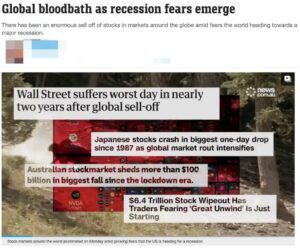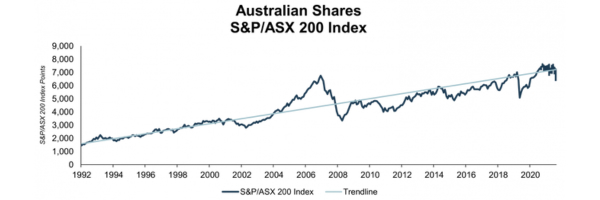The past month has been a whirlwind for investors (that’s you).
As the stock market experienced a sharp dip followed by a swift recovery. The media, as always, were quick to react.
Within seven days the headlines lurched from a “Stock market crash” and “Horror global bloodbath” – enough to trigger anxiety and uncertainty, even among seasoned investors – to “Global stocks finish strongest weekly run for nine months”.
So, what actually happened?
The stock market dropped due to fears of a recession on the back of weak jobs data, Japan’s interest rate hikes and US interest rates staying on hold.
As a result, the ASX 200 experienced its worst two-day performance since 2022.
But it’s earnings season (the period when all the big US companies report their earnings) and the data was a lot sunnier than expected, couple that with strong retail sales and we had a very quick recovery on our hands.
The S&P 500 had its best week of the year, and global stocks saw their strongest weekly performance in nine months. The Australian market also bounced back with five consecutive days of gains.
Are you dizzy yet? We wouldn’t blame you.
It’s important to remember that the media’s primary goal is not to provide sound financial advice, but to attract readership.
Their dramatic language and focus on short-term fluctuations can distort the reality of the market and lead to impulsive decisions.
The truth is market dips are a normal part of investing and reacting emotionally to them could be detrimental to your long-term financial goals.

Totally normal, not hysterical commentary.
Whatever you do, don’t panic.
When the market takes a downturn, it’s natural to feel anxious and consider selling your investments to avoid further losses.
However, “selling the dip” (the process of selling your portfolio when the market heads south) is often the worst move you can make. It locks in your losses and prevents you from participating in the market’s eventual recovery.
Remember, market dips are not only normal but can also present opportunities.
While it’s a mistake to sell at the bottom, it can also be a missed opportunity to not continue buying when markets are down. This is where the concept of dollar-cost averaging comes into play.
Dollar-cost averaging is a strategy where you invest a fixed amount of money at regular intervals, regardless of the market’s performance. When prices are low, your fixed investment buys more shares. When prices are high, it buys fewer.
Over time, this strategy can help smooth out the impact of market volatility and potentially lower your average cost per share.
The stock market has historically trended upwards over the long term, and short-term fluctuations are inevitable.
Volatility is an unavoidable part of the journey. By staying invested and even continuing to invest during downturns, you position yourself to benefit from the market’s resilience and growth potential.

Even despite the many wars, pandemics, terrorist attacks and other crises, the ASX has historically trended upward. IMAGE: Stockspot blog.
Your Adviser is your anchor.
If you’re feeling overwhelmed by the constant stream of financial news and market fluctuations, just turn off the news. “I am totally disconnected from the global news cycle” says Fox & Hare co-founder and adviser, Glen Hare.
“If anything, I find the news unnecessarily stressful. It’s always a half story, written to grab your attention and stress you into clicking, buying or something else. Very rarely, if ever, do I get the full story from a thirty second soundbite or 300-word article. If you really want to stay connected with the financial word, I’d recommend a long form podcast like Equity Mates”
If a news blackout is not your thing, or you need a little reassurance, don’t hesitate to reach out to your Fox & Hare adviser. Remember, your membership includes unlimited contact, use it! This is why you signed up, right?
We’re here to help you navigate the complexities of the market and make informed decisions based on your individual financial goals and risk tolerance.

Nuance, perspective and a touch of SpongeBob SquarePants to combat the hysteria over at our friends Equity Mates.
So, you’re saying I shouldn’t worry?
Investing is a marathon, not a sprint. Stay focused on the long term, avoid making impulsive decisions based on sensational headlines, and trust in the guidance of your adviser. Together, we will weather the frequent and inevitable market storms. Stick to the plan and financial freedom will be yours!
About Fox & Hare:
The company was Founded in 2017 by two former Macquarie execs. Fox & Hare aims to empower and educate Australians in the wealth accumulation phase of their life journey. Through the provision of a safe, inclusive and accepting environment, they’ve built a diverse and devoted following of 20- 40 somethings. Members come from many backgrounds, abilities and genders. The organisation and its co-founders have featured in the AFR, Equity Mates and Sydney Morning Herald. They have been included in Financial Standard’s Power 50 and Glen Hare was voted Australia’s best Financial Adviser for 2024.
Read more insights from our experts
Get Paid What You’re Worth: Your Guide to Getting a Raise in 2025
Ask for a raise, get paid what you’re worth in 2025! In short: This webinar breaks down the essential steps to prepare your case,...
Your Super: What the New $3 Million Tax Changes Mean for You
Will Albo’s changes to super affect you? We’ve broken down the Government’s superannuation changes so you can understand what’s actually happening, what isn’t, and...
Zac set a goal to save 100k before graduation
Here’s why he’s happy that he ‘failed’. In short: Zac’s goal to save $100,000 before graduation led him to create a “bucket” system for...
Get Hired in 2025: How to Stand Out and Land Your Dream Job
Upgrade Your Career and Earn More Money in 2025! In short: This guide breaks down the essential steps to get hired and boost your...
“I’m a Foster Mother to 8 Children”
In a nutshell: Nanay (mother) Butch is one of twelve foster mothers at SOS Children’s Village, Cebu. Together they provide loving homes to 116...